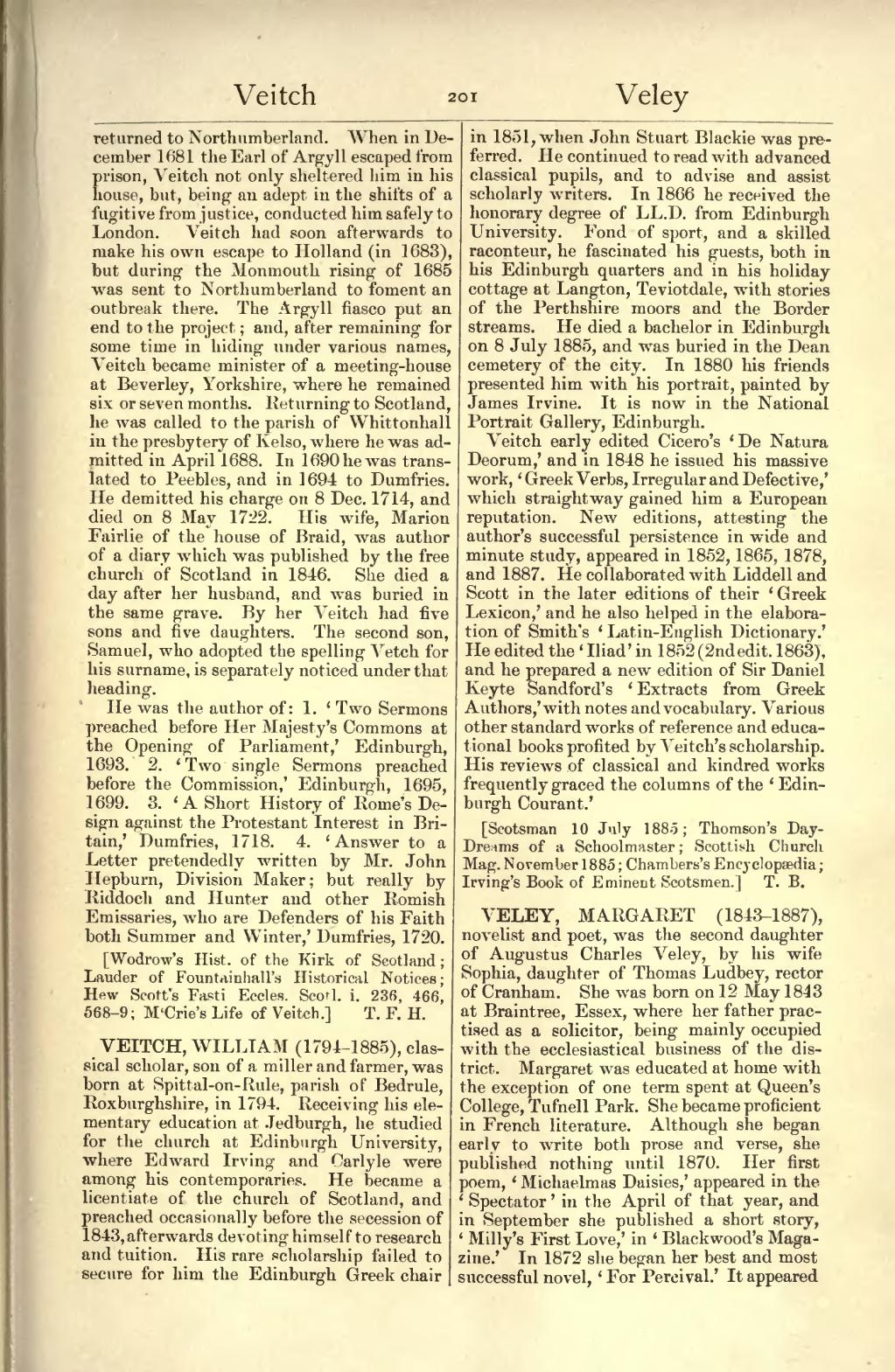returned to Northumberland. When in December 1681 the Earl of Argyll escaped from prison, Veitch not only sheltered him in his house, but, being an adept in the shifts of a fugitive from justice, conducted him safely to London. Veitch had soon afterwards to make his own escape to Holland (in 1683), but during the Monmouth rising of 1685 was sent to Northumberland to foment an outbreak there. The Argyll fiasco put an end to the project; and, after remaining for some time in hiding under various names, Veitch became minister of a meeting-house at Beverley, Yorkshire, where he remained six or seven months. Returning to Scotland, he was called to the parish of Whittonhall in the presbytery of Kelso, where he was admitted in April 1688. In 1690 he was translated to Peebles, and in 1694 to Dumfries. He demitted his charge on 8 Dec. 1714, and died on 8 May 1722. His wife, Marion Fairlie of the house of Braid, was author of a diary which was published by the free church of Scotland in 1846. She died a day after her husband, and was buried in the same grave. By her Veitch had five sons and five daughters. The second son, Samuel, who adopted the spelling Vetch [q. v.] for his surname, is separately noticed under that heading.
He was the author of: 1. ‘Two Sermons preached before Her Majesty's Commons at the Opening of Parliament,’ Edinburgh, 1693. 2. ‘Two single Sermons preached before the Commission,’ Edinburgh, 1695, 1699. 3. ‘A Short History of Rome's Design against the Protestant Interest in Britain,’ Dumfries, 1718. 4. ‘Answer to a Letter pretendedly written by Mr. John Hepburn, Division Maker; but really by Riddoch and Hunter and other Romish Emissaries, who are Defenders of his Faith both Summer and Winter,’ Dumfries, 1720.
[Wodrow's Hist. of the Kirk of Scotland; Lauder of Fountainhall's Historical Notices; Hew Scott's Fasti Eccles. Scotl. i. 236, 466, 568–9; M'Crie's Life of Veitch.]
VEITCH, WILLIAM (1794–1885), classical scholar, son of a miller and farmer, was born at Spittal-on-Rule, parish of Bedrule, Roxburghshire, in 1794. Receiving his elementary education at Jedburgh, he studied for the church at Edinburgh University, where Edward Irving and Carlyle were among his contemporaries. He became a licentiate of the church of Scotland, and preached occasionally before the secession of 1843, afterwards devoting himself to research and tuition. His rare scholarship failed to secure for him the Edinburgh Greek chair in 1851, when John Stuart Blackie was preferred. He continued to read with advanced classical pupils, and to advise and assist scholarly writers. In 1866 he received the honorary degree of LL.D. from Edinburgh University. Fond of sport, and a skilled raconteur, he fascinated his guests, both in his Edinburgh quarters and in his holiday cottage at Langton, Teviotdale, with stories of the Perthshire moors and the Border streams. He died a bachelor in Edinburgh on 8 July 1885, and was buried in the Dean cemetery of the city. In 1880 his friends presented him with his portrait, painted by James Irvine. It is now in the National Portrait Gallery, Edinburgh.
Veitch early edited Cicero's ‘De Natura Deorum,’ and in 1848 he issued his massive work, ‘Greek Verbs, Irregular and Defective,’ which straightway gained him a European reputation. New editions, attesting the author's successful persistence in wide and minute study, appeared in 1852, 1865, 1878, and 1887. He collaborated with Liddell and Scott in the later editions of their ‘Greek Lexicon,’ and he also helped in the elaboration of Smith's ‘Latin-English Dictionary.’ He edited the ‘Iliad’ in 1852 (2nd edit. 1863), and he prepared a new edition of Sir Daniel Keyte Sandford's ‘Extracts from Greek Authors,’ with notes and vocabulary. Various other standard works of reference and educational books profited by Veitch's scholarship. His reviews of classical and kindred works frequently graced the columns of the ‘Edinburgh Courant.’
[Scotsman 10 July 1885; Thomson's Day-Dreams of a Schoolmaster; Scottish Church Mag. November 1885; Chambers's Encyclopædia; Irving's Book of Eminent Scotsmen.]
VELEY, MARGARET (1843–1887), novelist and poet, was the second daughter of Augustus Charles Veley, by his wife Sophia, daughter of Thomas Ludbey, rector of Cranham. She was born on 12 May 1843 at Braintree, Essex, where her father practised as a solicitor, being mainly occupied with the ecclesiastical business of the district. Margaret was educated at home with the exception of one term spent at Queen's College, Tufnell Park. She became proficient in French literature. Although she began early to write both prose and verse, she published nothing until 1870. Her first poem, ‘Michaelmas Daisies,’ appeared in the ‘Spectator’ in the April of that year, and in September she published a short story, ‘Milly's First Love,’ in ‘Blackwood's Magazine.’ In 1872 she began her best and most successful novel, ‘For Percival.’ It appeared
